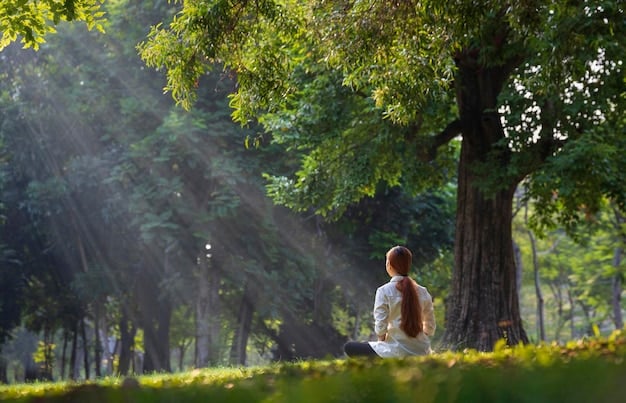Integrate Spirituality: Tips for Busy Individuals in the US

Integrating spirituality into daily life involves incorporating practices like mindfulness, meditation, and gratitude to enhance well-being and connection amid busy schedules, promoting a sense of peace and purpose.
In today’s fast-paced world, it’s easy to feel disconnected from our inner selves. But what if you could find a way to integrate spirituality seamlessly into your busy life? This article provides practical tips on how to integrate spirituality into your daily life, even when time is limited.
Embracing Spirituality: What Does It Mean?
Spirituality is often misunderstood as solely religious practice, but it extends far beyond organized religion. It’s about connecting with something larger than yourself, finding meaning and purpose, and nurturing your inner self. For busy individuals, this can seem like a daunting task, but it’s entirely achievable with a few simple adjustments.
Think of spirituality as your personal quest for inner peace and understanding. It’s the process of discovering what gives your life meaning and how you can live more authentically. This could involve anything from spending time in nature to practicing kindness and compassion in your daily interactions.
Understanding the Core of Spirituality
To truly integrate spirituality into your life, it’s helpful to understand its core components. Spirituality isn’t about adhering to rigid rules or doctrines; it’s about cultivating a deeper understanding of yourself and your place in the world. Here are some key aspects to consider:
- Connection: Spirituality involves connecting with something larger than yourself, whether it’s nature, humanity, or a higher power.
- Meaning and Purpose: It’s about finding meaning and purpose in your life, identifying what truly matters to you.
- Inner Peace: Spirituality aims to cultivate inner peace and tranquility, helping you navigate life’s challenges with greater ease.
- Self-Discovery: It’s a journey of self-discovery, exploring your inner landscape and understanding your true self.
By focusing on these core components, you can tailor your spiritual practice to fit your unique needs and preferences.
In essence, embracing spirituality is about creating moments of connection, purpose, and inner peace amidst the chaos of daily life. It’s a personalized journey that can transform your well-being and enrich your overall experience.
Morning Rituals for a Spiritual Start
Starting your day with a spiritual ritual can set a positive tone and keep you grounded amidst the demands of a busy schedule. Even just a few minutes dedicated to mindfulness or gratitude can make a significant difference in your overall well-being.
Consider waking up just 15 minutes earlier than usual to incorporate these practices. The benefits can ripple throughout your day, helping you stay centered and connected even when things get hectic.

Simple Morning Practices
Incorporating spiritual practices into your morning doesn’t have to be complicated. Here are a few simple rituals you can try:
- Mindful Breathing: Spend a few minutes focusing on your breath. Notice the sensation of the air entering and leaving your body, and let go of any thoughts that arise.
- Gratitude Journaling: Write down a few things you’re grateful for. This can help shift your focus to the positive aspects of your life.
- Affirmations: Recite positive affirmations to yourself. This can help boost your self-esteem and set a positive intention for the day.
These practices can be easily adapted to fit your personal preferences and time constraints. The key is to find something that resonates with you and helps you start your day with intention.
Establishing a consistent morning ritual can be a powerful way to prioritize your spiritual well-being. It’s a small investment of time that can yield significant rewards in terms of clarity, focus, and inner peace.
Mindfulness Throughout the Day
Mindfulness is the practice of being fully present in the moment, without judgment. Integrating mindfulness into your daily routine can help reduce stress, improve focus, and enhance your overall sense of well-being. Even short bursts of mindfulness can make a big difference.
There are many ways to practice mindfulness throughout the day, even while multitasking. The key is to be intentional about bringing your attention to the present moment, no matter what you’re doing.
Practical Mindfulness Techniques
Here are some practical techniques for incorporating mindfulness into your day:
- Mindful Eating: Pay attention to the taste, texture, and smell of your food. Savor each bite and avoid distractions like screens.
- Mindful Walking: Notice the sensation of your feet on the ground as you walk. Pay attention to your surroundings and the movement of your body.
- Mindful Listening: When someone is speaking to you, give them your full attention. Listen without interrupting or planning your response.
- Mindful Breathing Breaks: Take a few deep breaths throughout the day. Focus on the sensation of your breath entering and leaving your body.
These techniques can be practiced anywhere, at any time, making mindfulness accessible even for the busiest individuals.
Mindfulness is a valuable tool for navigating the challenges of daily life with greater ease and awareness. By simply bringing your attention to the present moment, you can cultivate a sense of calm and clarity that can transform your experience.
Connecting with Nature
Spending time in nature has been shown to have numerous benefits for both physical and mental health. Connecting with nature can help reduce stress, improve mood, and enhance your sense of well-being. Even a few minutes spent outdoors can make a difference.
If you live in a city, finding opportunities to connect with nature may require a bit more effort. However, there are still plenty of ways to incorporate nature into your daily life, even in an urban environment.

Integrating Nature into Your Routine
Here are some ways to integrate nature into your daily routine:
- Walk in a Park: Take a walk in a local park or green space. Observe the plants, animals, and natural features around you.
- Gardening: Start a small garden, either indoors or outdoors. Tending to plants can be a therapeutic and grounding activity.
- Nature Sounds: Listen to nature sounds, such as rain, birdsong, or ocean waves. This can help create a sense of calm and relaxation.
- Outdoor Exercise: Exercise outdoors whenever possible. This can help you connect with nature while also improving your physical fitness.
By making a conscious effort to connect with nature, you can reap the numerous benefits it has to offer. It’s a simple yet powerful way to enhance your spiritual well-being and reconnect with the natural world.
Connecting with nature is a vital component of spiritual well-being. It’s a reminder of our interconnectedness with all living things and a source of profound peace and inspiration.
Acts of Kindness and Compassion
Practicing kindness and compassion is a powerful way to connect with others and cultivate a sense of purpose and meaning in your life. Acts of kindness can be small or large, but they all have the potential to make a positive impact on both the giver and the receiver.
Kindness and compassion are not just about doing good deeds; they’re about cultivating a genuine sense of empathy and care for others. This involves seeing the world from another person’s perspective and acting in ways that alleviate their suffering.
Ways to Show Kindness
Here are some ways to incorporate acts of kindness and compassion into your daily life:
- Volunteer: Dedicate some time to volunteering for a cause you care about. This can be a deeply rewarding experience and a great way to give back to your community.
- Help a Neighbor: Offer to help a neighbor with a task, such as carrying groceries or mowing the lawn.
- Offer a Compliment: Give someone a genuine compliment. This can brighten their day and boost their self-esteem.
- Practice Active Listening: When someone is sharing their feelings with you, listen with empathy and understanding.
By making a conscious effort to practice kindness and compassion, you can create a ripple effect of positivity in your life and the lives of others. It’s a simple yet profound way to cultivate a more meaningful and fulfilling existence.
Acts of kindness and compassion are essential components of spiritual growth. They remind us of our shared humanity and the importance of supporting and uplifting one another.
Digital Detox and Reflection
In today’s digital age, it’s easy to become overwhelmed by technology and constantly bombarded with information. Taking a digital detox and dedicating time to reflection can help you reconnect with yourself and cultivate a greater sense of inner peace. It’s important to disconnect to reconnect.
A digital detox doesn’t have to be a complete withdrawal from technology. It can be as simple as setting aside a few hours each day to disconnect from screens and engage in activities that nourish your soul.
Creating Space for Reflection
Here are some ways to create space for reflection in your daily life:
- Turn Off Notifications: Turn off notifications on your phone and computer. This can help reduce distractions and allow you to focus on the present moment.
- Create Tech-Free Zones: Designate certain areas of your home as tech-free zones, such as the bedroom or dining room.
- Schedule Digital Breaks: Schedule regular digital breaks throughout the day. Use this time to stretch, meditate, or connect with nature.
- Journaling: Spend some time journaling about your thoughts and feelings. This can help you process your emotions and gain clarity.
By creating space for digital detox and reflection, you can cultivate a greater sense of presence, clarity, and inner peace. It’s a valuable practice for maintaining your spiritual well-being in the modern world.
Digital detox and reflection are powerful tools for reconnecting with yourself and cultivating a deeper sense of inner peace. They are essential for maintaining balance and well-being in today’s fast-paced, technology-driven world.
| Key Point | Brief Description |
|---|---|
| 🙏 Morning Rituals | Start with mindful breathing or gratitude to set a positive tone. |
| 🌿 Connect with Nature | Take walks in parks or listen to nature sounds for stress reduction. |
| 💖 Kindness & Compassion | Volunteer or offer compliments to cultivate empathy and purpose. |
| 📱 Digital Detox | Schedule breaks from technology to reconnect with inner peace. |
Frequently Asked Questions (FAQ)
▼
Spirituality involves connecting with something transcendent, like nature or a higher conscious rather than strict religious practice,. It emphasizes finding meaning, purpose, and nurturing your inner self. It’s a personalized quest of self-discovery, understanding and peace.
▼
Start by adding small spiritual practices to your morning routine, such as meditation or gratitude. Practice mindfulness during daily tasks. Then create short moments to intentionally connect.
▼
You can practice mindful eating by carefully savoring each bite, mindful walking by noticing surrounding environment, and mindful listening. You can also incorporate breathing breaks to help center yourself.
▼
Spending time in nature reduces stress and elevates mood. You can connect, explore ,and reflect. Nature is a constant reminder of interconnected universe and may reduce anxious thoughts, giving clarity.
▼
Digital detoxing reduces distraction, helps you reconnect with your thoughts and feelings, and cultivates inner tranquility. Turning off notifications, creating tech-free zones and scheduling breakes are all helpful practices.
Conclusion
Integrating spirituality into your daily life as a busy individual is entirely possible with practical tips. Through embracing these practices, you can foster peace, deepen your connection to self and the world, and live a more focused, spiritual, and meaningful life, even amidst the busyness of modern life.





